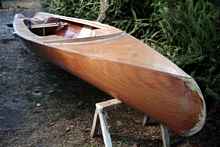|
I built this 4.5 metre (15 ft.) sliding seat rowing skiff to my
own design in a couple of weeks in our backyard. Constructed in
3mm tensioned klinki over Port Orford (white) cedar (a plantation
tree in New Zealand) backbone and gunwhales with three klinki
bulkheads plus bow stemhead and transom in double laminated klinki,
everything epoxy coated with some glass and carbon reinforcing.
 |
Sliding seat rowing skiff |
This is the third to this design (the first two were for women
with fixed seat rowing positions) I’ve built and the light
construction plus the semi-monocoque makes them easy to handle
and also decently fast rowers with stability to catch a big snapper
and not capsize. Also the three buoyancy compartments make the
boats unsinkable and capable of open Hauraki Gulf passages.
 |
Bow |
This one is for my own use and the odd concave curve in the aft
end deck is to swing a caught fish aboard into a half tube and
also to allow the crew to push off from shallow water and get
aboard keeping the centre of weight down a bit lower. The first
two required the owners to step aboard over the gunwhales and
this was slightly awkward for small women, the boat rocking until
their weight was centred. Not that it mattered, the wide, flared
beam gave safe heeling without capsize anyway, but just slightly
alarming at first.
 |
Half tube |
The fine stern requires weight to be central in the hull and
stops stern dragging and the resulting lower speed, hence the
fairly long after deck. The inverted half cone area forward of
the rower’s seat position is to allow the rower to lean
back without destroying his or her back on the bulkhead.
 |
Sliding seat |
The hatchet shaped blades are also in double laminated klinki
with stripped white cedar and hollow shafts.
 |
Finished hull |
The sliding seat has furniture castors for rollers and these
are filled with epoxy glue to stop them swiveling, then glued
into routed areas set into the laminated ply seat base.
P.S
Hi Chuck, Here are a couple more photographs of the shifting
and transportation of the boat, carried through the house and
into Jacques' VW. Since launching I've shortened the sliding distance
of the rails - and made different footrests. The slender hull
rows very quickly and surfs the upper Waitemata Harbour waves
easily and makes a very attractive wake.
Cheers Gary
*****

|

